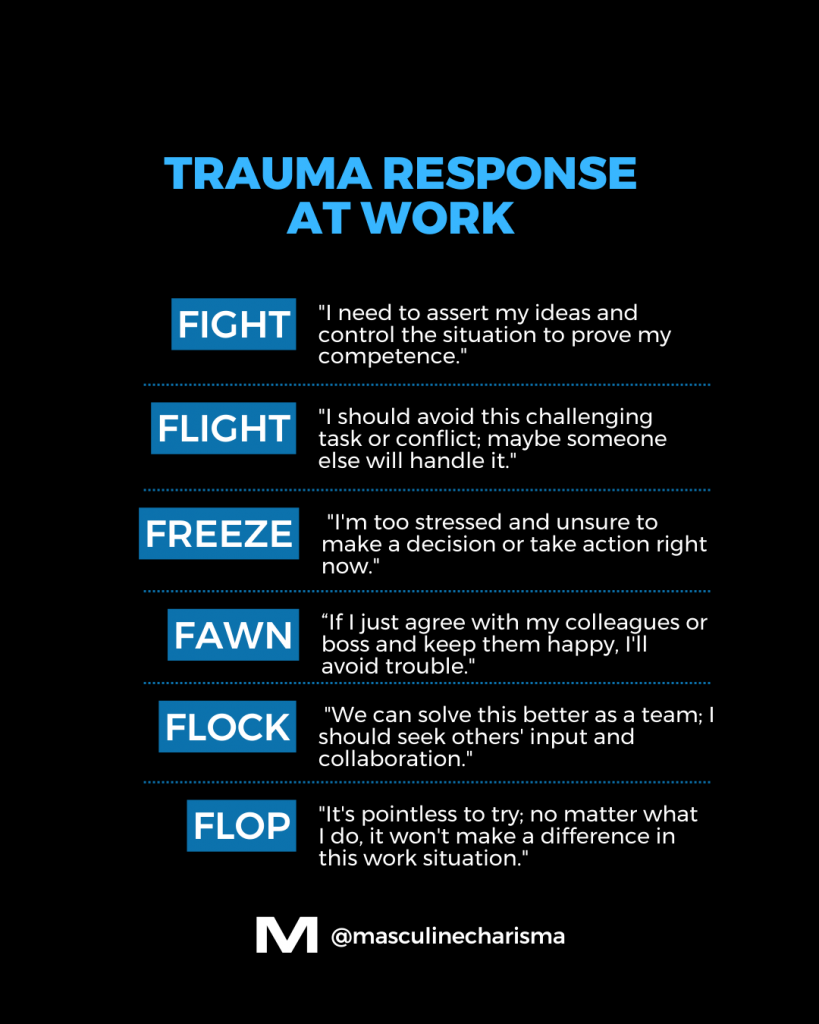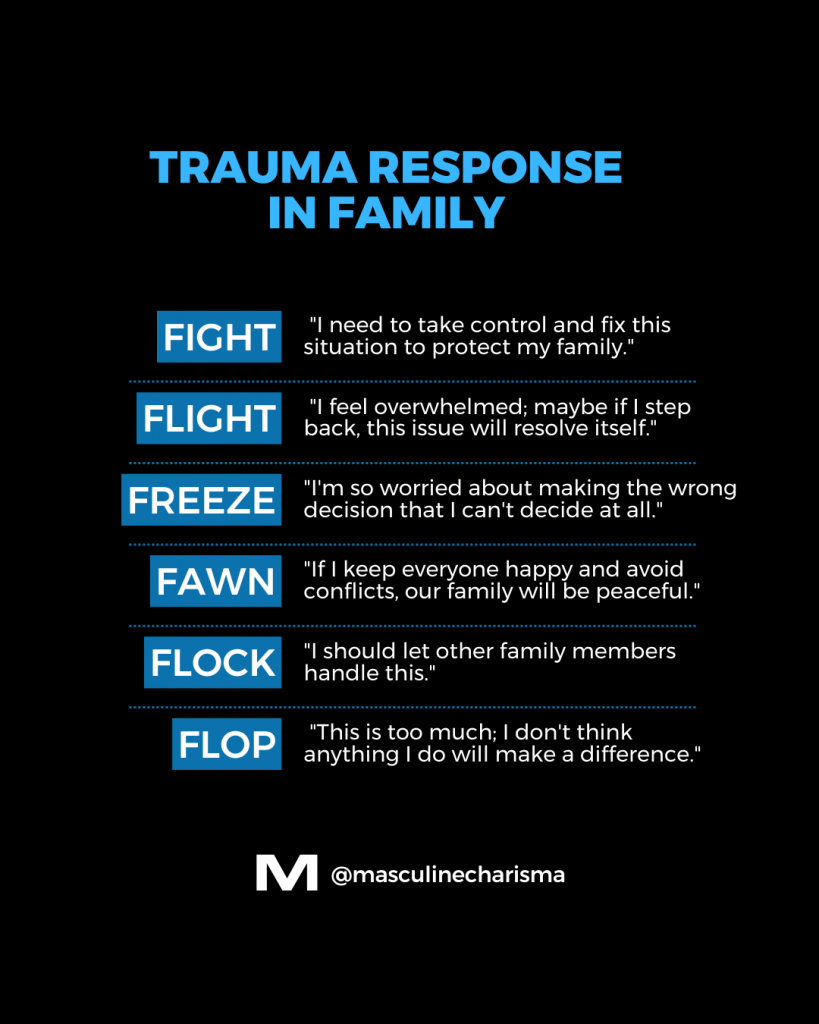Let’s talk about the not-so-pretty side of our psyche – trauma responses. These sneaky buggers dictate so much of what we do, from that knee-jerk reaction to lash out to the sudden urge to ghost everyone and binge Netflix.
It’s not just about facing fears; it’s about recognising our weird brain’s wiring and learning to dance with it instead of tripping over our own feet.
Trauma responses are instinctive reactions that individuals exhibit when faced with situations that remind them of past traumatic experiences, acting as protective mechanisms to manage stress, fear, or threat.
6 Trauma Responses & Their Meanings
- FIGHT: Aggressively confronting any perceived threat.
- FLIGHT: Escaping or withdrawing from danger.
- FREEZE: Becoming incapacitated in the face of a threat.
- FAWN: Quickly trying to appease or please to avoid conflict.
- FLOCK: Seeking safety and comfort by gathering with others.
- FLOP: Feeling powerless and giving up in response to stress or threat.

Trauma Response In Dating
- FIGHT: “I need to control the situation and make my date see my value.”
- FLIGHT: “t’s better to leave before things go wrong or I am rejected.”
- FREEZE: “I’m too nervous to take action or express how I truly feel.”
- FAWN: “If I just keep agreeing and pleasing them, they’ll like me more.”
- FLOCK: “I feel safer and more comfortable dating someone people approve.”
- FLOP: “There’s no point in dating; I don’t believe this will work out anyway.”

Trauma Response In Communication
- FIGHT: “I must prove I’m right and dominate this conversation.”
- FLIGHT: “I need to get out of this conversation as quickly as possible.”
- FREEZE: “I’m overwhelmed. I don’t know what to say or do.”
- FAWN: “I must agree and be pleasant to avoid any conflict.”
- FLOCK: “I should find support and approval from others to handle this situation.”
- FLOP: “It’s useless to try; I can’t make a difference in this conversation.”

Trauma Response In Relationships
- FIGHT: “I must win this argument to assert my point and maintain control in our relationship.”
- FLIGHT: “I should avoid this conflict or discussion; it’s better to disengage than confront issues.”
- FREEZE: “I’m too overwhelmed to respond or communicate effectively in this situation.”
- FAWN: “If I just keep my partner happy and avoid conflict, our relationship will be fine.”
- FLOCK: “We should rely on our family or friends’ advice and support to resolve our issues.”
- FLOP: “This is hopeless; there’s nothing I can do to improve our relationship.”

Trauma Response At Work
- FIGHT: “I need to assert my ideas and control the situation to prove my competence.”
- FLIGHT: “I should avoid this challenging task or conflict; maybe someone else will handle it.”
- FREEZE: “I’m too stressed and unsure to make a decision or take action right now.”
- FAWN: “If I just agree with my colleagues or boss and keep them happy, I’ll avoid trouble.”
- FLOCK: “We can solve this better as a team; I should seek others’ input and collaboration.”
- FLOP: “It’s pointless to try; no matter what I do, it won’t make a difference in this work situation.”

Trauma Response In Family
- FIGHT: “I need to take control and fix this situation to protect my family.”
- FLIGHT: “I feel overwhelmed; maybe if I step back, this issue will resolve itself.”
- FREEZE: “I’m so worried about making the wrong decision that I can’t decide at all.”
- FAWN: “If I keep everyone happy and avoid conflicts, our family will be peaceful.”
- FLOCK: “I should let other family members handle this.”
- FLOP: “This is too much; I don’t think anything I do will make a difference.”

Wrapping up this overview into the murky waters of trauma responses, let’s get real: this stuff isn’t just psychological jargon, it’s the code our brains run on when things get tough. We’ve looked at how these responses play out in dating, communication, relationships, at work, and within families. Whether it’s going full ‘Fight Club’ in an argument, pulling a Houdini when things heat up, or just freezing like a deer in headlights, we’ve all been there.
But here’s the kicker: becoming aware of these patterns is like getting the cheat codes to your own brain. Once you know your go-to responses, you can start to rewrite the script. And yeah, it’s not going to be a walk in the park. It’s more like retraining a wild, slightly neurotic animal. But it’s worth it.
So next time you find yourself gearing up for a fight or ready to bolt, take a breath. Ask yourself, ‘Is this me, or is it just my trauma response playing DJ with my emotions?’ Remember, you’re not just your reactions. You’re the guy holding the reins, and it’s time to steer this thing in a direction that actually makes sense for you.

